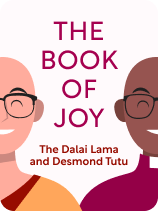

This article is an excerpt from the Shortform book guide to "The Book of Joy" by The Dalai Lama, Desmond Tutu, and Douglas Abrams. Shortform has the world's best summaries and analyses of books you should be reading.
Like this article? Sign up for a free trial here.
Why is suffering good? How does suffering make you a better person?
According to Desmond Tutu and the Dalai Lama in The Book of Joy, suffering isn’t always bad. In fact, suffering can lead to positive emotional traits such as compassion and generosity and helps you cope with mortality.
Continue reading to understand why suffering is good for the soul.
Suffering Can Lead to Insight or Opportunity
Suffering has the potential to leave you bitter or resentful, but if you choose to find meaning in your suffering, it can also give you the opportunity to grow. Tutu and the Dalai Lama argue why suffering is good: compassion and generosity of spirit rarely come without suffering. For example, if you’ve experienced what it’s like to be physically impaired, you’re more likely to feel compassion when someone else has a similar experience.
(Shortform note: If it feels impossible to find meaning in suffering, outside intervention can help. One study found that caregivers who regularly interact with the suffering of other people, such as nurses, can help patients derive meaning from their pain by supporting them to construct a narrative around it. By listening to a patient’s story about an illness or injury, nurses can help them reflect on the experience and draw meaningful conclusions that improve the patient’s experience.)
When suffering truly feels pointless, Tutu and the Dalai Lama counsel to remember that suffering often leads to joy. They explain that joy is not the antithesis of suffering—it’s what comes after suffering. Experiencing something hard allows you to better appreciate moments of joy. For example, when you’ve experienced a temporary physical ailment, you’re even more grateful when you regain your health and mobility.
(Shortform note: The theory that people grow as a result of traumatic experiences, sometimes referred to as post-traumatic growth, is based on research on people’s self-perception of how they responded to trauma, with little evidence pointing to concrete changes. One systematic review of the research suggests that people grow in response to positive and traumatic experiences, suggesting that perhaps it’s human nature to evolve over the course of a lifetime, regardless of the quality of life experiences.)
Tutu and the Dalai Lama acknowledge that humanity’s fear and anxiety around death may be one of our greatest sources of suffering. Many of us live in fear of our own mortality. However, they explain, death is yet another part of life that’s beyond your control. It’s not only natural and inevitable, but necessary. As with other sources of suffering, you can find meaning in death. Knowing that our life spans are limited offers inspiration to live intentionally, in service of others, and, ultimately, in service of joy.
(Shortform note: In Being Mortal, Atul Gawande argues that the modern approach to death stems from our fear of dying and ultimately harms our personal and societal well-being. To approach dying better, he argues, we need to reorient our thinking from a future mindset to present mindset. A present-focused mindset, for example, might prioritize the immediate comfort of a patient over ongoing attempts to prolong their life. Refocusing on the present, Gawands explains, will enable us to live more fulfilling lives, right up until the very end.)

———End of Preview———
Like what you just read? Read the rest of the world's best book summary and analysis of The Dalai Lama, Desmond Tutu, and Douglas Abrams's "The Book of Joy" at Shortform.
Here's what you'll find in our full The Book of Joy summary:
- Archbishop Desmond Tutu and His Holiness the Dalai Lama's guide to joy
- What joy actually is and why it matters so much
- How to find joy exactly where you are, no matter what your life looks like






